
Seeing as it's New Year's Eve, I thought we might consider this unique point of view on partying from Waylon, Willie and the good people of Buddha Records.
"I Can Get Off On You" - Waylon Jennings & Willie Nelson
Cheers.








 Happy Holidays, people! Whether you're Christian, Muslim or Jew, you love the live rock 'n roll. That's just God's way. So this season, THE DRIFTWOOD SINGERS celebrate with selections from the amazing online archive of live recordings collected by the late and legendary (and Jewish) concert promoter Bill Graham. We hear tell it's probably going to get shut down soon because of lawsuits by the bands, so check it out before it's too late! Meanwhile, unwrap these gems and enjoy.
Happy Holidays, people! Whether you're Christian, Muslim or Jew, you love the live rock 'n roll. That's just God's way. So this season, THE DRIFTWOOD SINGERS celebrate with selections from the amazing online archive of live recordings collected by the late and legendary (and Jewish) concert promoter Bill Graham. We hear tell it's probably going to get shut down soon because of lawsuits by the bands, so check it out before it's too late! Meanwhile, unwrap these gems and enjoy.

 Well, what we should have foreseen as the inevitable has happened: last night, while unwinding after a busy day of driving, baby-watching and preparing for our separate holiday departures, the wife and I were watching a little TV and we got roped in to Bravo’s culinary reality show Top Chef. After the emotional trauma that is Project Runway, we’d been doubters about Top Chef. Fashion can be judged simply by appearance, food isn’t quite like that. You gots to taste it. Still, there are enough operatic personalities, brooding geniuses and annoying assholes on the show to keep you interested.
Well, what we should have foreseen as the inevitable has happened: last night, while unwinding after a busy day of driving, baby-watching and preparing for our separate holiday departures, the wife and I were watching a little TV and we got roped in to Bravo’s culinary reality show Top Chef. After the emotional trauma that is Project Runway, we’d been doubters about Top Chef. Fashion can be judged simply by appearance, food isn’t quite like that. You gots to taste it. Still, there are enough operatic personalities, brooding geniuses and annoying assholes on the show to keep you interested.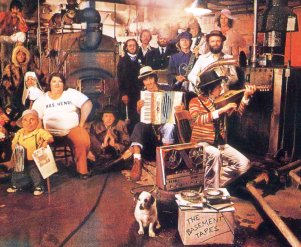 At any rate, it might be a source of shame, regret and concern to now be potentially hooked to another empty TV show, but it wasn’t a total wash. During the show I was looking at the January issue of Mojo, which has, you won’t be surprised to learn, yet another Bob Dylan cover. Mojo rates the entire Dylan catalog, which is pretty funny. It won’t be too much of a spoiler to reveal that Dylan and the Dead comes in last place (even after Down in the Groove!). I remember seeing in interview with Bob Weir where someone was asking him about that tour with Dylan and the interviewer said "I think that may have been the worst record that either the Dead or Dylan had ever done." Weir was a pretty good sport about it, laughing and laughing.
At any rate, it might be a source of shame, regret and concern to now be potentially hooked to another empty TV show, but it wasn’t a total wash. During the show I was looking at the January issue of Mojo, which has, you won’t be surprised to learn, yet another Bob Dylan cover. Mojo rates the entire Dylan catalog, which is pretty funny. It won’t be too much of a spoiler to reveal that Dylan and the Dead comes in last place (even after Down in the Groove!). I remember seeing in interview with Bob Weir where someone was asking him about that tour with Dylan and the interviewer said "I think that may have been the worst record that either the Dead or Dylan had ever done." Weir was a pretty good sport about it, laughing and laughing. I had a stack of records I was planning to transfer to MP3 and post here, but I couldn’t figure out what the connecting thread was. But then it hit me: all the songs were either taken from soundtrack records, or they were by artists that I’d discovered from a movie soundtrack.
I had a stack of records I was planning to transfer to MP3 and post here, but I couldn’t figure out what the connecting thread was. But then it hit me: all the songs were either taken from soundtrack records, or they were by artists that I’d discovered from a movie soundtrack. The unvarnished truth is usually varnished for a good reason. In the case of my Top Ten albums of 2006, the reasons for my choices, I've concluded after some shallow introspection, were indeed spurious. In some instances, downright shameful. You've seen how thin my arguments were on albums 10 and 9. I'd be much more qualified to come up with a Top Three list. Without further handwringing, here's the AWFUL TRUTH of the other eight albums I've not yet addressed:
The unvarnished truth is usually varnished for a good reason. In the case of my Top Ten albums of 2006, the reasons for my choices, I've concluded after some shallow introspection, were indeed spurious. In some instances, downright shameful. You've seen how thin my arguments were on albums 10 and 9. I'd be much more qualified to come up with a Top Three list. Without further handwringing, here's the AWFUL TRUTH of the other eight albums I've not yet addressed: It's probably unfair to include Rogue's Gallery: Pirate Ballads, Sea Songs & Chanteys on my Top Ten of '06. For one, it's got 43 songs on it. For two, it's got dozens of people on it, from great to repugnant (Brian Ferry to Sting), all made unfailingly interesting by the fantastical, grim, barnicle-encrusted sea chantey genre. Even Sting is good! I can't stress enough how effing wonderful this album is. As much as I'm suspicious of any record cooked up by a movie actor (Johnny Depp, who sings and collaborates as "Jack Shit"), this was a genius idea on its face. The songs, all real traditional tunes, many from the 17th century, share a similarly circular haul-away-boys song structure and lyrics full of rotting morals, desperation and spiritual sea-sickness, a drunken cast of kings, whores and gamblers -- everything that rock-and-roll aspires to be and usually isn't anymore (hence the Captain Jack Sparrow/Keith Richards nexus). Tom Waits has basically had this netherworld to himself for 30 years and now here's an excuse for David Thomas (Pere Ubu), Van Dyke Parks and Akron/Family to try on his stinking, clanking, fish-filled boots. Just marinate in a few of these and enjoy. (By the way, I got the above image from a website describing some infamous lesbian pirates, Anne Bonny and Mary Read.)
It's probably unfair to include Rogue's Gallery: Pirate Ballads, Sea Songs & Chanteys on my Top Ten of '06. For one, it's got 43 songs on it. For two, it's got dozens of people on it, from great to repugnant (Brian Ferry to Sting), all made unfailingly interesting by the fantastical, grim, barnicle-encrusted sea chantey genre. Even Sting is good! I can't stress enough how effing wonderful this album is. As much as I'm suspicious of any record cooked up by a movie actor (Johnny Depp, who sings and collaborates as "Jack Shit"), this was a genius idea on its face. The songs, all real traditional tunes, many from the 17th century, share a similarly circular haul-away-boys song structure and lyrics full of rotting morals, desperation and spiritual sea-sickness, a drunken cast of kings, whores and gamblers -- everything that rock-and-roll aspires to be and usually isn't anymore (hence the Captain Jack Sparrow/Keith Richards nexus). Tom Waits has basically had this netherworld to himself for 30 years and now here's an excuse for David Thomas (Pere Ubu), Van Dyke Parks and Akron/Family to try on his stinking, clanking, fish-filled boots. Just marinate in a few of these and enjoy. (By the way, I got the above image from a website describing some infamous lesbian pirates, Anne Bonny and Mary Read.) 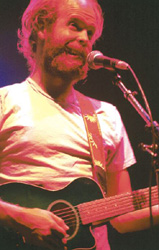 Over the next week or two, I'll attempt to explain, elaborate, explicate and generally rationalize some of my 2006 Top Ten album picks, recently submitted to the Jackin' Pop Critics Poll put on by the music blog Idolator. It's a personal challenge that will surely reveal the random subjectivity and dangerous lack of any real aesthetic framework involved. I can confess right up front that I've not heard every album produced in 2006, so already I'm building my empire in the sand next to an oncoming tsunami. That said, the Sophists proved you can prove anything with fancy words. And I've got some fancy words, trust me. Like specious and nugatory.
Over the next week or two, I'll attempt to explain, elaborate, explicate and generally rationalize some of my 2006 Top Ten album picks, recently submitted to the Jackin' Pop Critics Poll put on by the music blog Idolator. It's a personal challenge that will surely reveal the random subjectivity and dangerous lack of any real aesthetic framework involved. I can confess right up front that I've not heard every album produced in 2006, so already I'm building my empire in the sand next to an oncoming tsunami. That said, the Sophists proved you can prove anything with fancy words. And I've got some fancy words, trust me. Like specious and nugatory. Continuing our theme of diving into the secret (read: shameful) vault of specious 1970s jazz albums that might -- just might! -- actually be worthwhile, I bring you O'Donel Levy. Yes, that's him in the tux. His album Windows from 1976 is so underrated, AllMusic doesn't even bother to review it, just slapping two-and-a-half stars on the sucker and calling it a day. That might be smart. But I bought this sealed in plastic and brand new in a junk shop in Brooklyn based entirely on the album cover, which features Levy jamming on his Gibson hollow-body electric while maxing and relaxing in his pimped-out Chevy, lovingly dubbed (and stenciled) "Good Times Machine." The music? Funky. Jazzy. Funky and jazzy. Fusion! Listen, there's some geniunely groovy guitar work on the opener, "Panama Red," especially when he applies echo effect to add psyche flavor to his noodlings. I also love that he decides to end the song on a big, fat synth fart that can only be interpreted in stankonian semiotics as "da funk." As with Mr. Poncho's offering in the last post, I can't entirely stand by this -- especially not the theme song for his van, which I include here as a cautionary warning against diving too deep -- but "Panama Red" isn't a bad little tune for, say, sweeping out your garage or something. The whole thing comes off as a cross between "Suicide is Painless," "Copacabana," and "clean-up in aisle five." But in a kinda-sorta okay way!
Continuing our theme of diving into the secret (read: shameful) vault of specious 1970s jazz albums that might -- just might! -- actually be worthwhile, I bring you O'Donel Levy. Yes, that's him in the tux. His album Windows from 1976 is so underrated, AllMusic doesn't even bother to review it, just slapping two-and-a-half stars on the sucker and calling it a day. That might be smart. But I bought this sealed in plastic and brand new in a junk shop in Brooklyn based entirely on the album cover, which features Levy jamming on his Gibson hollow-body electric while maxing and relaxing in his pimped-out Chevy, lovingly dubbed (and stenciled) "Good Times Machine." The music? Funky. Jazzy. Funky and jazzy. Fusion! Listen, there's some geniunely groovy guitar work on the opener, "Panama Red," especially when he applies echo effect to add psyche flavor to his noodlings. I also love that he decides to end the song on a big, fat synth fart that can only be interpreted in stankonian semiotics as "da funk." As with Mr. Poncho's offering in the last post, I can't entirely stand by this -- especially not the theme song for his van, which I include here as a cautionary warning against diving too deep -- but "Panama Red" isn't a bad little tune for, say, sweeping out your garage or something. The whole thing comes off as a cross between "Suicide is Painless," "Copacabana," and "clean-up in aisle five." But in a kinda-sorta okay way!
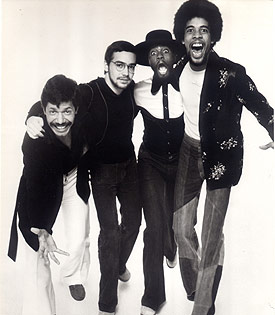 The itemized list of grievances against Return to Forever is indeed a long document. Maybe the most fitting description of the band also serves as the most succinct and damning criticism: fusion supergroup. Or maybe another pair of equally odious words will suffice: Al DiMeola. At any rate, after reading Nate Chinen’s excellent article in the NYT about jazz MP3 blogs working to redeem the 70s – the lost decade of jazz. I went rummaging through some stinky stacks of dusty vinyl with a mind for sharing a spurned track a two. If RTF weren’t spurned, I don’t know what was.
The itemized list of grievances against Return to Forever is indeed a long document. Maybe the most fitting description of the band also serves as the most succinct and damning criticism: fusion supergroup. Or maybe another pair of equally odious words will suffice: Al DiMeola. At any rate, after reading Nate Chinen’s excellent article in the NYT about jazz MP3 blogs working to redeem the 70s – the lost decade of jazz. I went rummaging through some stinky stacks of dusty vinyl with a mind for sharing a spurned track a two. If RTF weren’t spurned, I don’t know what was. Before she became the popular face of gospel music, before she sang at the Washington Monument leading up to MLK’s speech, Mahalia Jackson had to arrive on the scene. She moved up to Chicago from New Orleans in the 1920s, part of that huge wave of African-Americans who migrated north. Those from Mississippi, Louisiana and Tennessee often ended up in Detroit or Chicago. If you were living in Virginia or North Carolina or Georgia, you might point yourself north and wind up in Philadelphia or New York. It was in Chicago that Jackson met Thomas A. Dorsey, a blues singer from Georgia who’d had a conversion experience (plus a few nerous breakdowns) and switched from raunchy blues to writing and selling gospel songs.
Before she became the popular face of gospel music, before she sang at the Washington Monument leading up to MLK’s speech, Mahalia Jackson had to arrive on the scene. She moved up to Chicago from New Orleans in the 1920s, part of that huge wave of African-Americans who migrated north. Those from Mississippi, Louisiana and Tennessee often ended up in Detroit or Chicago. If you were living in Virginia or North Carolina or Georgia, you might point yourself north and wind up in Philadelphia or New York. It was in Chicago that Jackson met Thomas A. Dorsey, a blues singer from Georgia who’d had a conversion experience (plus a few nerous breakdowns) and switched from raunchy blues to writing and selling gospel songs.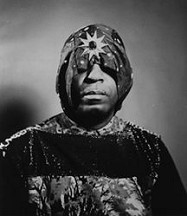 The heavy organ also reminds me of Sun Ra, another southerner who relocated to Chicago. I like to think of Ra, born Sonny Blount in Alabama but who claimed to be from Saturn, Thomas Dorsey, who recorded some seriously raunchy double entendre blues and hokum tracks under the name Georgia Tom when he wasn’t penning his sacred material, and Mahalia, all working in the same city, mixing it up – sacred, secular, extraterrestrial.
The heavy organ also reminds me of Sun Ra, another southerner who relocated to Chicago. I like to think of Ra, born Sonny Blount in Alabama but who claimed to be from Saturn, Thomas Dorsey, who recorded some seriously raunchy double entendre blues and hokum tracks under the name Georgia Tom when he wasn’t penning his sacred material, and Mahalia, all working in the same city, mixing it up – sacred, secular, extraterrestrial.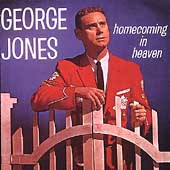
 It seems there's a battle royal going on in the Williamsburg/Greenpoint section of Brooklyn over the lack of Polish musical acts in the concerts thrown at McCarren Pool, an apparently indie-rocker-infested park located smack dab in the middle of ... a giant Polish enclave. The hipsters may pay the exhorbinant rents, but it's the Poles who collect it. So may I suggest the Greenpointers seek out one Tadeusz Nalepa. Yes, fans, he's still around! The founder and lead guitarist of Breakout, the famed 70s Polish prog-rock band. As I've reported before, I found their 1976 masterwork NOL (short for Niezidentyfikowany Obeikt Latajacy, Polish, of course, for Unidentified Flying Object) at a stoop sale in Greenpoint back in 1995. Time has passed but the timelessness of Polish prog rock has not. Please give a listen to this sample, then track down Tadeusz and let the Polish-Hipster healing begin.
It seems there's a battle royal going on in the Williamsburg/Greenpoint section of Brooklyn over the lack of Polish musical acts in the concerts thrown at McCarren Pool, an apparently indie-rocker-infested park located smack dab in the middle of ... a giant Polish enclave. The hipsters may pay the exhorbinant rents, but it's the Poles who collect it. So may I suggest the Greenpointers seek out one Tadeusz Nalepa. Yes, fans, he's still around! The founder and lead guitarist of Breakout, the famed 70s Polish prog-rock band. As I've reported before, I found their 1976 masterwork NOL (short for Niezidentyfikowany Obeikt Latajacy, Polish, of course, for Unidentified Flying Object) at a stoop sale in Greenpoint back in 1995. Time has passed but the timelessness of Polish prog rock has not. Please give a listen to this sample, then track down Tadeusz and let the Polish-Hipster healing begin. As Captain Beefheart once sang, “Everything’s wrong, at the same time it’s right.” That’s sort of how I feel about John Phillips’ solo debut, known as John the Wolfking of L.A, which has recently been re-issued on CD for the first time. In the end, wrong wins out over right (as usual).
As Captain Beefheart once sang, “Everything’s wrong, at the same time it’s right.” That’s sort of how I feel about John Phillips’ solo debut, known as John the Wolfking of L.A, which has recently been re-issued on CD for the first time. In the end, wrong wins out over right (as usual). In an age of global madness, it's increasingly difficult to distinguish truth from fiction, right from wrong, good music from bad. In a world where Matt Lauer must define for a nation when Iraq has turned into a "civil war," figuring out whether Grace Slick's solo material is "good" listening is pretty much anybody's guess.
In an age of global madness, it's increasingly difficult to distinguish truth from fiction, right from wrong, good music from bad. In a world where Matt Lauer must define for a nation when Iraq has turned into a "civil war," figuring out whether Grace Slick's solo material is "good" listening is pretty much anybody's guess.  Okay, not a bad number. But that's kid play compared to this Gilbert O'Sullivan stuff, which even ardent taste contortionists are challenged to classify as "good." On the one hand, there's the Paul McCartney-gone-wild esprit de ham element, piano frivolity borne of the love of Tin Pan Alley; on the other there's the inbred Irish sad-sackism curdled into a pop porridge that a lot of right-thinking people just have to shove to the middle of the table when Grandma Gilbert serves it up. I don't blame them. But, alas, I love these songs and find myself listening to them over and over and over and over again. It's my own pop jingoism, I guess: my music right or wrong. It started with loving "Alone Again (Naturally)," which Mr. Poncho covered here previously, and led to these cuts from his 1972 American debut, Gilbert O'Sullivan: Himself. I've included O'Sullivan's winsome LP opener in the first tune.
Okay, not a bad number. But that's kid play compared to this Gilbert O'Sullivan stuff, which even ardent taste contortionists are challenged to classify as "good." On the one hand, there's the Paul McCartney-gone-wild esprit de ham element, piano frivolity borne of the love of Tin Pan Alley; on the other there's the inbred Irish sad-sackism curdled into a pop porridge that a lot of right-thinking people just have to shove to the middle of the table when Grandma Gilbert serves it up. I don't blame them. But, alas, I love these songs and find myself listening to them over and over and over and over again. It's my own pop jingoism, I guess: my music right or wrong. It started with loving "Alone Again (Naturally)," which Mr. Poncho covered here previously, and led to these cuts from his 1972 American debut, Gilbert O'Sullivan: Himself. I've included O'Sullivan's winsome LP opener in the first tune.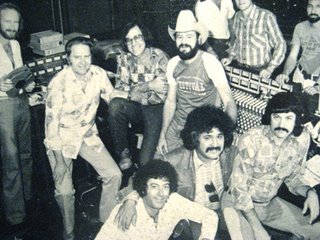
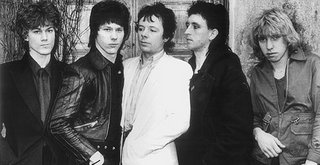
 Recently I went to my local Tower Records for their Going Out Of Business Sale. I felt like a scavenger, but that didn't stop me from buying a couple of things I never would have bought at full price. One was an early Ultravox album, and the other was the 2000 reissue of All Things Must Pass by George Harrison.
Recently I went to my local Tower Records for their Going Out Of Business Sale. I felt like a scavenger, but that didn't stop me from buying a couple of things I never would have bought at full price. One was an early Ultravox album, and the other was the 2000 reissue of All Things Must Pass by George Harrison.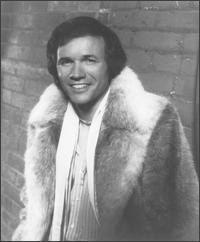
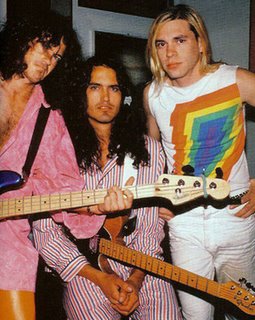 There’s cause for celebration. The day passed by unnoticed, with all of the exciting impending political upheaval, but as of about November 1, we’ve been up and sailing for a year now at the Driftwood Singers Presents. All thanks to Lefty for pioneering the technology that went into converting old moldy vinyl into new crackly MP3s. If nothing else, this forum has helped to virtually replicate that experience of sharing music, talking nonsense and listening raptly with a handful of rabid and obsessive music-fan friends. Another, more personal, cause for celebration is that after dealing with a receiver that was on the fritz and on the blink, a crappy system that got increasingly worse over the past eight or so years, I finally got a proper component that won’t go silent for stretches, require beatings or drive me to have a temper tantrum ( I promise, it’s safe to come back over for a drink). In honor of all that, here’s a few bits of sound pleasure.
There’s cause for celebration. The day passed by unnoticed, with all of the exciting impending political upheaval, but as of about November 1, we’ve been up and sailing for a year now at the Driftwood Singers Presents. All thanks to Lefty for pioneering the technology that went into converting old moldy vinyl into new crackly MP3s. If nothing else, this forum has helped to virtually replicate that experience of sharing music, talking nonsense and listening raptly with a handful of rabid and obsessive music-fan friends. Another, more personal, cause for celebration is that after dealing with a receiver that was on the fritz and on the blink, a crappy system that got increasingly worse over the past eight or so years, I finally got a proper component that won’t go silent for stretches, require beatings or drive me to have a temper tantrum ( I promise, it’s safe to come back over for a drink). In honor of all that, here’s a few bits of sound pleasure.
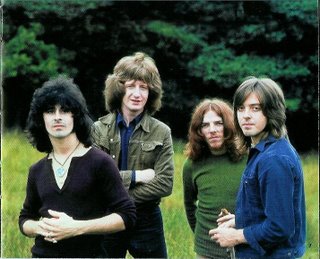
 As a high school skateboard nerd, I spent many a summer afternoon grinding the rails in some empty parking lot with Bad Brains blasting on my Sony Walkman. My Steve Olson Skull Skate was strictly Minor Threat- and Bad Brains-powered. At home, I would stare intensely at this picture of HR (right) while flipping my favorite BB's cassette, 1988's "Live," over and over, dreaming of the epic pit. I'd crank up "I" and "At the Movies" to prime myself for an all-ages warehouse punk show on the outskirts of town, lacing up my combat boots and spiking my hair with cement-like gel -- No matter what they say, never give in! Never give in! Reagan made us all very earnest. When I eventaully picked up guitar, I spent hours trying to emulate the wiry, precision punk-metal chaos of Dr. Know's solos. It was impossible. What was so amazing was that the pure machine-gun fury was met with sweet downbeat reggae numbers that opened my static suburban universe to the mysterious splendors of B. Marley, Peter Tosh and Big Youth. The discovery of weed was only a matter of time.
As a high school skateboard nerd, I spent many a summer afternoon grinding the rails in some empty parking lot with Bad Brains blasting on my Sony Walkman. My Steve Olson Skull Skate was strictly Minor Threat- and Bad Brains-powered. At home, I would stare intensely at this picture of HR (right) while flipping my favorite BB's cassette, 1988's "Live," over and over, dreaming of the epic pit. I'd crank up "I" and "At the Movies" to prime myself for an all-ages warehouse punk show on the outskirts of town, lacing up my combat boots and spiking my hair with cement-like gel -- No matter what they say, never give in! Never give in! Reagan made us all very earnest. When I eventaully picked up guitar, I spent hours trying to emulate the wiry, precision punk-metal chaos of Dr. Know's solos. It was impossible. What was so amazing was that the pure machine-gun fury was met with sweet downbeat reggae numbers that opened my static suburban universe to the mysterious splendors of B. Marley, Peter Tosh and Big Youth. The discovery of weed was only a matter of time. Probably unlike most great songwriters, Leonard Cohen’s songs often seem to lend themselves to being interpreted by others. I don’t think the same is true of Dylan or Lennon/McCartney. I’m not sure what this might mean. It’s not that Cohen’s recordings of his own tunes aren’t excellent either. I just read that Cohen was the president of the debating society when he was at McGill University. His grandfather was a Talmudic scholar. I was just looking at a Cohen songbook yesterday and there was curious ID picture of him from sort of Greek driving club. I wondered why that was, but then I just learned that he -- like the great painter Brice Marden whose retrospective just went up at MoMa and about whom there have been a bunch of articles appearing lately - owns a house on the island of Hydra. Must be a fun place to hang out.
Probably unlike most great songwriters, Leonard Cohen’s songs often seem to lend themselves to being interpreted by others. I don’t think the same is true of Dylan or Lennon/McCartney. I’m not sure what this might mean. It’s not that Cohen’s recordings of his own tunes aren’t excellent either. I just read that Cohen was the president of the debating society when he was at McGill University. His grandfather was a Talmudic scholar. I was just looking at a Cohen songbook yesterday and there was curious ID picture of him from sort of Greek driving club. I wondered why that was, but then I just learned that he -- like the great painter Brice Marden whose retrospective just went up at MoMa and about whom there have been a bunch of articles appearing lately - owns a house on the island of Hydra. Must be a fun place to hang out.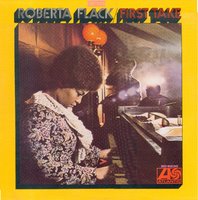 But this isn’t about Leonard Cohen. Nope. It’s about Roberta Flack. I love the cover (help me Lefty) of her album First Take so much. She’s got this great floral print dress on and she’s playing the piano with a rapt concentration or else it could be a sort of spiritual focus or maybe autistic despair or maybe self-obliterating doubt. Hard to say. What drew me to this record was the fact that bassist Ron Carter, who had probably only recently stopped playing with Miles Davis at the time, plays on it. One thing I can’t quite figure out is that it lists guitarist John Pizzarelli on the credits. But the John Pizzarelli I know of, son of Bucky, was, like 9 years old at the time, though he evidently started performing out at age six. I do like the thought of a 9-year-old joining Carter and Flack, though, whatever the case may be.
But this isn’t about Leonard Cohen. Nope. It’s about Roberta Flack. I love the cover (help me Lefty) of her album First Take so much. She’s got this great floral print dress on and she’s playing the piano with a rapt concentration or else it could be a sort of spiritual focus or maybe autistic despair or maybe self-obliterating doubt. Hard to say. What drew me to this record was the fact that bassist Ron Carter, who had probably only recently stopped playing with Miles Davis at the time, plays on it. One thing I can’t quite figure out is that it lists guitarist John Pizzarelli on the credits. But the John Pizzarelli I know of, son of Bucky, was, like 9 years old at the time, though he evidently started performing out at age six. I do like the thought of a 9-year-old joining Carter and Flack, though, whatever the case may be.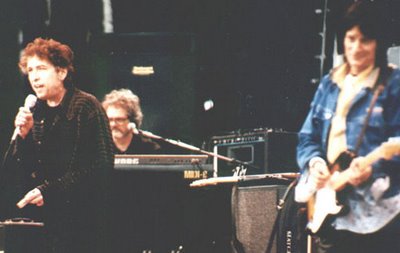 I’ve got a complicated theory to advance here, and I hope you’ll hear me out on this one. Like those internet sleuths who’ve uncovered Bob Dylan’s thieving from Civil War era poet Henry Timrod, I too think the bard has been stealing. But it’s more convoluted than that. Let me put it this way: Dylan’s been stealing from someone who was stealing from Dylan. Although maybe the theft was, at the time, from a future, not-yet-realized Dylan. Basically Dylan’s been mimicking Ronnie Wood who was somehow channeling a version of Dylan to come. I think Duke Ellington once said something like "It’s not plagiarism if you’re stealing from yourself." Maybe the rule holds true here too.
I’ve got a complicated theory to advance here, and I hope you’ll hear me out on this one. Like those internet sleuths who’ve uncovered Bob Dylan’s thieving from Civil War era poet Henry Timrod, I too think the bard has been stealing. But it’s more convoluted than that. Let me put it this way: Dylan’s been stealing from someone who was stealing from Dylan. Although maybe the theft was, at the time, from a future, not-yet-realized Dylan. Basically Dylan’s been mimicking Ronnie Wood who was somehow channeling a version of Dylan to come. I think Duke Ellington once said something like "It’s not plagiarism if you’re stealing from yourself." Maybe the rule holds true here too.